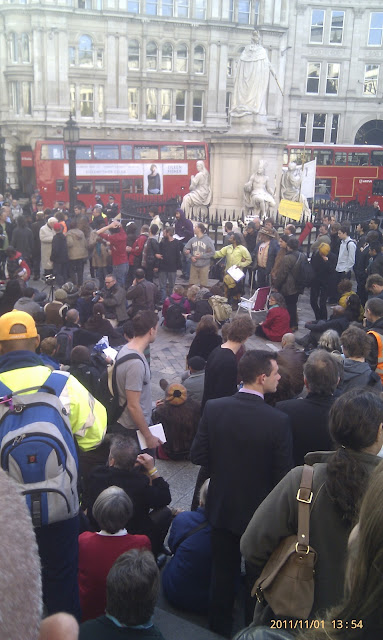This is something that the UK is sadly lagging behind much of the rest of the world in. However the current financial dire straits that the UK Government finances are in has at last meant that interest in Open Standards and by implication Open Source/Free Software is more than just 'making encouraging noises'.
The process seems to have the proprietary software companies rattled in that they are putting a lot of effort into making their point of view held. So much so that the consultation process has been delayed (it was due to end 1st May) because of an
undeclared conflict of interest of the person facilitating discussions. The new deadline for consultations was Monday 4th June 2012.
The Free Software Foundation Europe has already issued
its view on this. What follows here is my personal take on things.
First some general principals, why I think it would be a good idea for the IT that we the taxpayers pay for would be better done in as open as possible manner.
Modern computing is on the whole really complex. It is true that sometimes by clever design that complexity can appear simple but that does not change that fact that beneath the façade things are still complex. This is something generally true of our modern world.
Well here are the questions and my answers:
Criteria for open standards
1. How does this definition of open standard compare to your view of what makes a standard 'open'?
For a standard to be open, it must be available electronically at no cost to anyone who wishes to obtain a copy (a fee for printed copies is acceptable). There must be no requirement to pay royalties by anyone who produces or uses software which implements the standard.
Being royalty free is important not just in being a cost issue as implementing anything meaningful is naturally going to involve costs, many of which will be financial. It is a matter of principal that standards are jointly agreed for the benefit of the parties concerned. There should not be monetary advantage to just some of those parties at the disadvantage of the others. If a standard is NOT to the benefit of all parties (such as being able to freely exchange information, avoiding lock-in) it should not be graced by being a standard.
2. What will the Government be inhibited from doing if this definition of open standards is adopted for software interoperability, data and document formats across central government?
What will be inhibited are practicies to the detriment of the taxpayer who pays for the operation of government. Open standards will encourage work to be done once and reused/evolved. This means all stakeholders get the best return on their investment possible. As we live of a planet with finite resources this is a way of working we are going to have to get used to.
3. For businesses attempting to break into the government IT market, would this policy make things easier or more difficult – does it help to level the playing field?
Open standards will make it easier for smaller players to enter the government IT space in that the work will more likley be done using standard building blocks such as the LAMP stack and the well tested CPAN archive for the Perl language. Having well used componenets means that systems can be built with less surprses and mysterious 'cost overruns' which would otherwise deter companies with less resources from bidding for work.
4. How would mandating open standards for use in government IT for software interoperability, data and document formats affect your organisation?
Not applicable, as we do not directly interact with government departments.
5. What effect would this policy have on improving value for money in the provision of government services?
Open standards demystify IT and increase the number of people with skills they can take a pride in using, rather than just learning to use some capricious and arbitary, badly thought out system by wrote. The open standards based Raspberry Pi computer is a great example of this - a fully working general purpose computer for a consumer electronics price that is revolutionising IT education and beyond. Having work done by a motivated local (i.e. spend their wages in the community) workforce rather than sending millions back to global corporations by way of licence fees and other intellectual property related charges is clearly going to be a wiser way to spend taxpayers money.
6. Would this policy support innovation, competition and choice in delivery of government services?
Absolutley! Having a rich pallette of openley discussed and developed technologies to choose from and allowing ones technical staff to freely co-operate with like minded peers should allow the best solutions to bubble to the surface. There will be none of government being frced to have to make do with third rate solutions just because of contractual obligations. If someone develops a new algorithm that does the same job in half the time, one would hope that a standards body would be flexable enough to let all participants take advantage of genuine innovation.
7. In what way do software copyright licences and standards patent licences interact to support or prevent interoperability?
If software licences are restrictive they could be a very great drag on interoperability. So much so that such software really needs to be considered if it can be replaced. In a system run for the benefit of man we should be aiming for the best interoperability conducive to efficency and security.
8. How could adopting (Fair) Reasonable and Non Discriminatory ((F)RAND) standards deliver a level playing field for open source and proprietary software solution providers?
FRAND is still licencing so should be absolutley rejected. If something is part of a standard it should be shared without any restrictions being placed on it, including being used as a building block for some other standard.
9. Does selecting open standards which are compatible with a free or open source software licence exclude certain suppliers or products?
Yes if they have a corporate mindset obsessed with placing a monetary value on everything.
10. Does a promise of non-assertion of a patent when used in open source software alleviate concerns relating to patents and royalty charging?
No, as a promise can be withdrawn or broken.
11. Should a different rationale be applied when purchasing off-the-shelf software solutions than is applied when purchasing bespoke solutions?
If open standards were more widley adopted the powerful building block culture will mean that many bespoke systems are not as bespoke as once thought. These are just two ends of the same continum.
12. In terms of standards for software interoperability, data and document formats, is there a need for the Government to engage with or provide funding for specific committees/bodies?
It is absolutley in the interests of the taxpayer that the advanatges outlined above come to Government IT spending. There would be some very useful scope in funding for oversight on keeping this process on track, particularly if done as a close co-operation with bodies with the same aims in other countries.
Compared to the money currently flowing to corporations for intellectual property the amounts involved would be very small. For over 20 years now the whole Free software/Open source movement has been surviving very well on a large number of small sources of funding rather than very centralised grant awarding infrastructure.
Trying to build such a thing on a grand scale would be a mistake. This needs light touch guideance only.
13. Are there any are other policy options which would meet the described outcomes more effectively?
None that I know of.
Open standards mandation
1. What criteria should the Government consider when deciding whether it is appropriate to mandate particular standards?
If having a standard here would help avoid costly 'reinventing the wheel' by system specifiers.
If interoperability between the proposed system and others is an important part of its design.
If using standards whould make best use of the skill bases of available staff to do the work (e.g. is the benefit of writing the software in a new programming language worth the need to retrain or hire specificaly skilled staff).
2. What effect would mandating particular open standards have on improving value for money in the provision of government services?
If standards means that products for which licence fees are payable could be avoided there would be a great imporovement in value for money in that money would be paid for work done/services delivered in support e.t.c. rather than the nebulous idea of 'intellectual property'.
3. Are there any legal or procurement barriers to mandating specific open standards in the UK Government's IT?
(Left blank as we are not lawyers)
4. Could mandation of competing open standards for the same function deliver interoperable software and information at reduced cost?
Yes as was of doing things with IT have overlapping capability spaces. A good example of this would be choosing to implement a web site in Java or Perl. Perl would have an advantage for things that need to change quickly, but Java for big system engineering.
5. Could mandation of open standards promote anti-competitive behaviour in public procurement?
No, it would help prevent the anti-competitive behaviour associated with certain players holding key strategic pieces of Intellectual Property.
6. How would mandation of specific open standards for government IT software interoperability, data and document formats affect your organisation/business?
It lowers the entry cost of information interchange with the Government. e.g. not having to buy a copy of Microsoft Office just because some government department will only accept docx files.
7. How should the Government best deal with the issue of change relating to legacy systems or incompatible updates to existing open standards?
A legacy system is by definition a stable API so it should be possible to write a set of interfaces to it to make it appear to the outside world like it is part of the new system (although perhaps with much lower performance). It may also be worth-while to simulate the old system using rapid application development methodology to afford a seamless transition into something that can fully interchange data.
8. What should trigger the review of an open standard that has already been mandated?
If adhereing to a standard becomes a significant drag behind the current accepted state of the art. Governemt need not be trail blazers but it is poor value for the taxpayer if they lag behind in using now outdated methods to do things.
9. How should the Government strike a balance between nurturing innovation and conforming to standards?
Governemnt should aim to stay in the middle of mainstream use. Not rush out in front, apart from funding research, nor tail behind due to standards that are too slow to be updated. Staying with the crowd maximises the interoperability benefits this is all about.
10. How should the Government confirm that a solution claiming conformity to a standard is interoperable in practice?
Extensive suites of automated regression tests for all software produced.
11. Are there any are other policy options which would meet the objective more effectively?
International alignment
1. Is the proposed UK policy compatible with European policies, directives and regulations (existing or planned) such as the European Interoperability Framework version 2.0 and the reform proposal for European Standardisation?
(Left blank as we are not lawyers)
2. Will the open standards policy be beneficial or detrimental for innovation and competition in the UK and Europe?
Beneficial as it gives control back to individual technologists, not the legal departments of large corporations.
3. Are there any are other policy options which would meet the objectives described in this consultation paper more effectively?


































